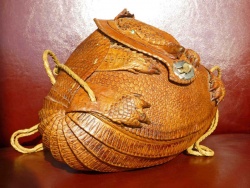Difference between revisions of "Armadillo leather"
From www.leather-dictionary.com - The Leather Dictionary
| Line 41: | Line 41: | ||
<br> | <br> | ||
<p align=center> | <p align=center> | ||
| − | <flashow>//www.youtube.com/v/ | + | <flashow>//www.youtube.com/v/-tJtZmJCWLw&fs=1&color1=0x660000&color2=0x550000&border=1|width=500|height=281,25</flashow> |
</p> | </p> | ||
<p align=center> | <p align=center> | ||
Revision as of 16:09, 12 June 2019
Armadillos originated in South America but have expanded up to the south of the USA. In Brazil they are called tatu. There are various types of Armadillos and the largest species can weigh up to 60 kilos and are over a metre long. The armadillos have an armour-like skin which is rarely used for leather production.
Armadillo from Brazil. - Armadillo on a coin from Uruguay.
Handbag made of armadillo leather and armor.
Basket made of armadillo armor.
Knife handle from the tail of the armadillo from Argentina.
Video about leather of different animal species
Leather of different animal species - Exotic leather.
Other exotic leather
- Alligator leather
- Alpaca fur
- Antelope leather
- Bird leather
- Bull testicles
- Caiman leather
- Camel leather
- Carpincho leather
- Cat fur
- Chicken leather
- Crocodile leather
- Dog leather
- Donkey leather
- Elephant leather
- Fish leather: Eel, shark, salmon, moray eel, stingray and many others
- Frog leather - Toad leather
- Giraffe leather
- Hippo Leather
- Horsehide - Horse leather
- Kangaroo leather
- Llama Fur
- Lizard leather
- Ostrich leather
- Pangolin leather
- Peccary leather
- Rumen leather
- Sealskin leather
- Snakeskin
- Turtle skin
- Walrus leather
- Yak leather
- Zebra hide















 a kotori web solution
a kotori web solution